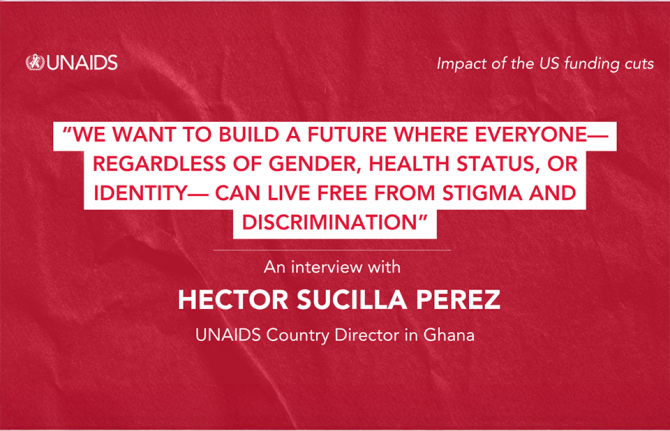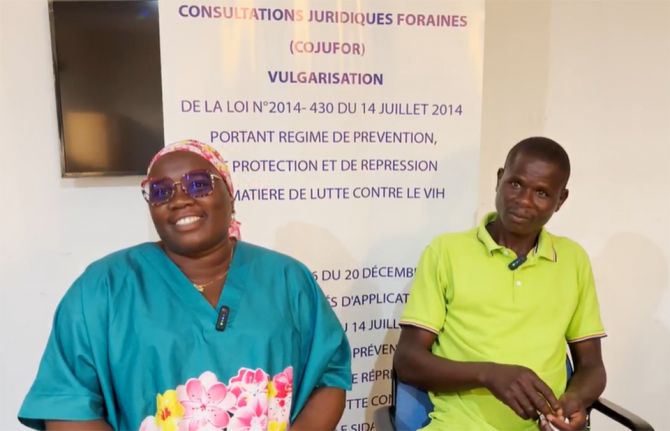

Update
Food and nutrition: essential to achieve the Fast-Track Targets
31 May 2015
31 May 2015 31 May 2015Food and nutrition to support people living with HIV are key elements to reach the UNAIDS Fast-Track Targets, according to the participants of a recent consultation on nutrition and HIV held in Geneva, Switzerland.
Coorganized by the World Food Programme and UNAIDS, the event focused on the critical importance of food and nutrition support for the 90–90–90 treatment targets, but also for preventing new HIV infections, especially among adolescent girls and young women.
The participants shared evidence and experience on the impacts of malnutrition and food insecurity on HIV treatment and on how food security and social protection contribute to preventing new HIV infections and to improving adherence among adolescents. The participants also noted that conducting HIV testing alongside child growth monitoring can enable more timely diagnosis and treatment of malnourished children living with HIV.
Lucie Cluver, Associate Professor at Oxford University, noted that in South Africa, adolescent girls who received food at school had a 40% reduction in unprotected or casual sex than those who did not receive food at school. And adolescents on HIV treatment who had enough food were two and a half times more likely to adhere to HIV treatment than their peers who did not.
According to the participants, the new UNAIDS 2016–2021 Strategy should focus on improving the quality of services provided to people living with and most affected by HIV. It should rely on multisectoral approaches that enable the delivery of integrated packages of support, including food and nutrition, social protection, livelihood support and education.
Quotes
“It is only by putting people at the centre that we can reach the end of the AIDS epidemic. Food and nutrition are essential to achieve the Fast-Track Targets. Effective systematization and communication of evidence on food and nutrition to inform HIV policy and programmes is urgently needed.”
“I believe we can achieve the three zeroes, but the lack of food and nutrition support is still an obstacle. Malnourished people living with HIV are two to six times more likely to die in the first six months of treatment, and hunger is one of the barriers to long-term adherence. It’s time we prioritize food and nutrition in the Fast-Track approach.”
"Nutrition and food support for people living with HIV is one of five elements included in the United States Congressional Care and Treatment Earmark for PEPFAR bilateral support."
Related





Update
Fast-Tracking the AIDS response for young women and adolescent girls in Africa
08 June 2015
08 June 2015 08 June 2015Considerable advances have been made in the global response to the AIDS epidemic over the last decades. Despite this progress, however, young women and adolescent girls in Africa are still being left behind.
In the sub-Saharan region, AIDS-related illnesses remain the leading cause of death among girls and women of reproductive age. In 2013, 74% of new HIV infections among African adolescents were among adolescent girls. Young women and adolescent girls acquire HIV on average five to seven years earlier than young men, and in some countries in the region HIV prevalence among this population can be as much as seven times that of their male counterparts.
In order to guide regional and global advocacy and inform political dialogue on HIV prevention and treatment among young women and adolescent girls, UNAIDS and the African Union have launched a joint report entitled Empower young women and adolescent girls: Fast-Tracking the end of the AIDS epidemic in Africa.
The document outlines three political commitments to advance the rights and empowerment of Africa’s young women and girls to help Fast-Track an AIDS response firmly rooted in gender equality and social justice. The commitments are to stop new HIV infections among young women and adolescent girls in order to ensure that AIDS is no longer the leading cause of death among adolescents; to empower young women and adolescent girls through comprehensive sexuality education; and to prevent HIV infections among children and keep their mothers alive.
The launch took place on 8 June as part of the 26th Gender is My Agenda Campaign pre-summit to the African Union meeting in Johannesburg, South Africa.
Quotes
“It is fitting that this report is launched here in Africa, as this is the epicentre of the global AIDS epidemic. It is here that we must Fast-Track our responses in order to help end AIDS as a public health threat by 2030.”
“The commitment to end the AIDS epidemic by 2030 cannot be attained unless a strategic and comprehensive focus is placed on young women and adolescent girls in every single African country.”
“In the absence of a vaccine, ending gender-based violence, keeping girls in school and empowering young women and adolescent girls are the best options we have available.”
“We need to educate our children to speak out and we need to speak to them their own language. They need to know that HIV is real. The best teacher is the mother and the best place to educate young women and girls is in the home.”
“As we work with our communities, our networks, our health service providers and our governments, we must commit to demanding a comprehensive focus on young women in the AIDS response.”
Region/country
- West and Central Africa
- Benin
- Burkina Faso
- Burundi
- Cameroon
- Cape Verde
- Central African Republic
- Chad
- Congo
- Côte d'Ivoire
- Democratic Republic of the Congo
- Equatorial Guinea
- Gabon
- Gambia
- Ghana
- Guinea-Bissau
- Guinea
- Liberia
- Mali
- Mauritania
- Niger
- Nigeria
- Sao Tome and Principe
- Senegal
- Sierra Leone
- Togo
- Eastern and Southern Africa
- Angola
- Botswana
- Comoros
- Eritrea
- Ethiopia
- Kenya
- Lesotho
- Madagascar
- Malawi
- Mauritius
- Mozambique
- Namibia
- Rwanda
- Seychelles
- South Africa
- South Sudan
- Eswatini
- Uganda
- United Republic of Tanzania
- Zambia
- Zimbabwe
Related

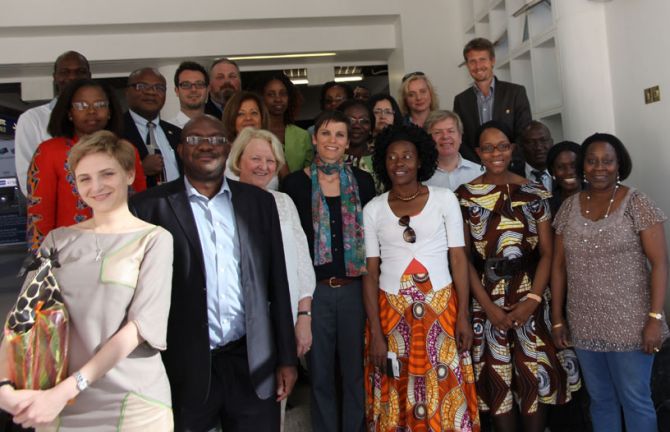
Update
Zimbabwe’s accelerated response to HIV
09 June 2015
09 June 2015 09 June 2015A delegation of the UNAIDS Programme Coordinating Board (PCB) conducted a field visit to Zimbabwe from 2 to 4 June to get a first-hand look at how the country is fast-tracking its national AIDS response to end the epidemic as a public health threat by 2030.
Zimbabwe has one of the largest HIV epidemics in the world, with an estimated adult HIV prevalence of 15% and 1.4 million people living with HIV. However, the country is accelerating action and increasing investment in its HIV prevention and treatment programmes to reverse this situation.
Zimbabwe laid the foundations for accelerating its response when, in 2000, it introduced an innovative levy on taxable income, where 3% would be dedicated to funding AIDS programmes. Thanks to the tax levy, the country increased its domestic financing for HIV by 40% between 2011 and 2014 and together with international investment—which currently accounts for 85% of the total funding— the country is achieving positive results. Zimbabwe has seen a 60% reduction of HIV-related deaths since the peak of the epidemic in 1997 and a 75% reduction in new HIV infections among children in the past 10 years, according to national estimates.
“Zimbabwe is pioneering programmes that are reaching out to an increasing number of people in need. Things that seemed impossible, like stopping new HIV infections among children, are now a tangible reality for the country,” said UNAIDS Deputy Executive Director Jan Beagle, who led the visit. “Zimbabwe’s decision to invest scarce resources in the national AIDS response demonstrates that cost-effective programmes, with significant use of public–private partnerships and community delivery systems, are smart investments providing positive results.”
At a gathering with government health and finance representatives, the private sector, development partners and international and regional nongovernmental organizations, PCB members discussed opportunities and challenges in meeting ambitious Fast-Track targets to ending the AIDS epidemic by 2030. All partners highlighted the need to put the AIDS response on a sustainable footing. They agreed that despite progress and increased commitment to investment from Zimbabwe’s government, including its ambition to reach 30% of HIV expenditures from domestic resources by 2018, there will still be need for global solidarity in support of the response over a number of years.
The increasingly important role played by the private sector in reaching people was recognized, as well as the opportunities that the sector offers to contribute even further to the AIDS response.
“In Zimbabwe, there is strong engagement in the response across political leadership, ministries, parliamentarians, civil society and the private sector,” said Tapuwa Magure, Chief Executive Officer of the National AIDS Council. “This multisectoral cooperation is key to Fast-Track the AIDS response, which Zimbabwe is committed to do, including action to achieving the 90–90–90 treatment targets.”
Young people and HIV
The issue of young people and HIV was high on the agenda during the field visit. Two thirds of the population in Zimbabwe is under 25 years and HIV prevalence is almost three times higher among women aged 15 to 24 than among men of the same age.
The PCB delegation discussed accelerating the AIDS response with adolescents and young adults at a school visit, at meetings with youth networks and in a meeting with young sex workers. Central issues that emerged included the importance of assisting all children to go to school and ensuring that they receive age appropriate, evidence informed sexuality education. How to better use mobile phone and social media technologies in HIV prevention were also high on the agenda. Young people were particularly concerned about improving access to HIV services in rural settings.
The PCB delegation included representatives from Zimbabwe, Switzerland, Ukraine, Morocco, Poland and United Kingdom, as well as from the non-governmental organizations represented on the PCB, and from UNAIDS Cosponsors. During the visit, the delegation met with national partners involved in the AIDS response, including representatives of government, the National AIDS Council, development partners, community and civil society organizations, the private sector and the United Nations country team. The delegation also visited several sites in and around Harare as well as Hwange District to see examples of provision of HIV and wider health services and community empowerment. Visits included clinics and community-based treatment delivery and HIV workplace programmes.
Region/country
Related

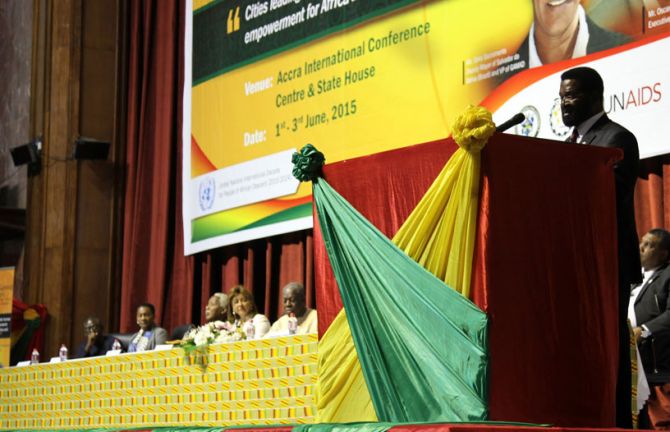

Update
Summit of African mayors and mayors of African descent mobilizes commitment to accelerate the HIV response
05 June 2015
05 June 2015 05 June 2015African mayors and mayors of African descent from more than 30 countries participating in a global conference in Accra, Ghana, explored how cities can accelerate the AIDS response and deliver specific results in HIV prevention, testing and treatment in the next five years.
The Fourth World Summit of Mayors and Leaders from Africa and of African Descent was held from 1 to 3 June and was hosted by the Lord Mayor of Accra, Alfred Vanderpuije.
During the summit, participants committed to the goal of ending the AIDS epidemic and discussed how to increase HIV testing, access to antiretroviral therapy and stopping new HIV infections among children.
Following a series of regional consultations, 18 mayors from Africa, Latin America and the United States of America signed the Paris Declaration on Fast-Track Cities, which calls for ending the AIDS epidemic in cities by 2030. The mayors agreed that by putting people at the centre of the response and addressing underlying issues, such as poverty, discrimination and violence against women and girls, their societies can be transformed.
The summit was convened within the framework of the International Decade for People of African Descent (2015–2024). It featured other thematic pillars, including gender equality and women’s empowerment, youth entrepreneurship and employment.
The event was co-organized by the Global Alliance of Mayors and Leaders from Africa and of African Descent, the African Renaissance and Diaspora Network, Inc., in partnership with the City of Accra, la Asociación Nacional de Alcaldes de Municipios con Población Afrodescendiente and UNAIDS.
Quotes
“As a member of the UNAIDS and Lancet Commission, I strongly endorse the Paris Declaration by mayors worldwide for Fast-Tracking the AIDS response in cities as a key strategy to end the AIDS epidemic by 2030. Together we will bring an end to the epidemic.”
“Addressing AIDS is an essential element of the summit because it lies at the core of our economic and social development efforts, since Africa is the hardest hit region. I am proud that Ghana has seen major reductions in HIV infections and AIDS-related deaths.”
“I am an advocate of the Paris Declaration. This is why in Brazil, together with the UNAIDS country office, we are mobilizing mayors and innovative partnerships to scale up the HIV response in cities.”
“In our technical assistance to Fast-Track cities, we aim to leverage their existing HIV programming to break down barriers to HIV testing, linkage to care and treatment for the populations with the highest HIV prevalence—women, people who inject drugs, sex workers and men who have sex with men.”
“If cities lead the way we will be able to reach the 90–90–90 targets.”
Region/country
Related
 Impact of US funding cuts on HIV programmes in Ghana
Impact of US funding cuts on HIV programmes in Ghana

08 April 2025


Update
UNAIDS declared climate neutral for 2012 and 2013
05 June 2015
05 June 2015 05 June 2015World Environment Day is celebrated every 5 June to encourage worldwide awareness and action for the environment. This year’s theme, “Seven billion dreams. One planet. Consume with care,” draws attention to the need for the responsible management of the planet’s natural resources.
In this context, UNAIDS is doing its part. The organization was recently declared climate neutral for 2012 and 2013. UNAIDS achieved this goal by following the United Nations Climate Neutral Strategy, which requires United Nations organizations to annually reduce and measure their greenhouse gas emissions (GHG) resulting from their facilities and operations such as travel.
The Secretariat has successfully collected and submitted these data for its headquarters as well as all country and regional offices since 2009.
Through the development and implementation of the UNAIDS Secretariat emissions reduction strategy (ERS), UNAIDS successfully reduced its GHG emissions by 14% from 2010 to 2013, almost tripling its ERS commitment of a 5% reduction.
UNAIDS has met the Secretary-General’s call for the United Nations to be climate neutral by 2020 and joins a limited group of United Nations organizations that are either wholly or partially climate neutral. The Secretariat is committed to continuing to reduce its GHG emissions by making reductions of emissions part of its business.
Quotes
“I encourage all [UN bodies] to commit to achieve a net-zero climate footprint (climate neutrality) by 2020 and consider to accelerate this to become climate neutral by the end of 2015…”
“Addressing climate change is a priority for UNAIDS not only in the way we operate but also in increasing our understanding of the implications climate change has on the AIDS epidemic and our response to it.”
Related

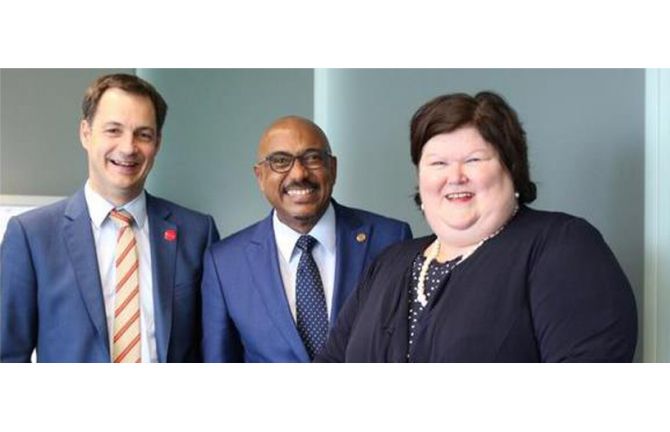
Update
Belgium pledges renewed funding for UNAIDS
04 June 2015
04 June 2015 04 June 2015The Belgian Minister of Development Cooperation, Alexander De Croo, has announced that Belgium will maintain its financial support for UNAIDS from 2016 to 2019. The pledge was made during a meeting between Mr De Croo, Belgian Minister of Social Affairs and Health Maggie De Block and UNAIDS Executive Director Michel Sidibé in Brussels on 3 June.
Separately, the Flemish Government also reconfirmed its financial support to UNAIDS until 2018.
During his visit, Mr Sidibé met with federal and regional government representatives. He stressed the key role played by the country’s civil society in keeping HIV on the agenda of the government.
Belgium is currently in the process of implementing its first ever national strategic HIV plan, which was launched together with UNAIDS at the end of 2013. The plan prioritizes efforts to reach the most affected populations, such as men who have sex with men and migrant workers. Despite relatively low numbers of people living with HIV in Belgium, the AIDS epidemic remains a concern as the yearly number of new HIV infections has not declined in recent years.
Quotes
“Coordination among multilateral organizations is important to increase efficiency and results.”
“I welcome Belgium’s leadership and its strong commitment towards ending the AIDS epidemic by 2030.”
Region/country

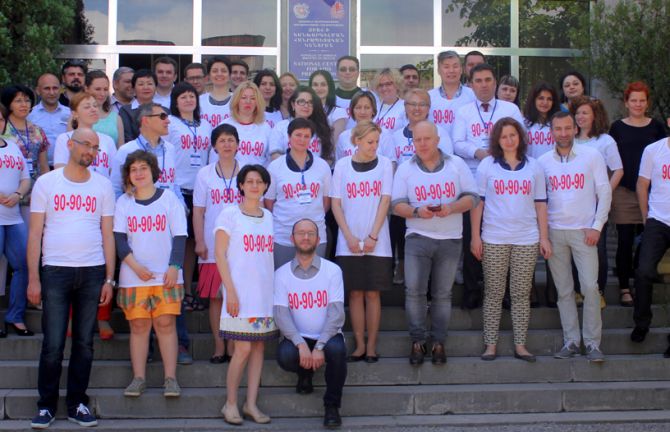
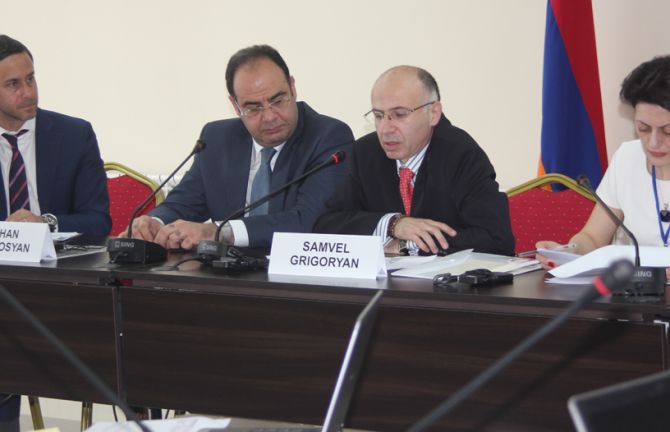
Update
Scaling up access to HIV testing and counselling in eastern Europe and central Asia
03 June 2015
03 June 2015 03 June 2015A regional consultation on scaling up access to HIV testing and counselling in eastern Europe and central Asia was held from 20 to 22 May in Yerevan, Armenia.
More than 50 participants from across the region, including community leaders, policy-makers, technical experts and representatives of UNAIDS Cosponsors discussed ways in which HIV testing could be expanded and better linked to treatment. They made legal and policy recommendations in a joint appeal to governments that focused on simplifying and diversifying HIV services.
The participants highlighted that community-based approaches, such as rapid, mobile and home-based HIV testing, provide an opportunity to reach people and places that were not previously covered by services. Community-based models can contribute to the elimination of logistical and social barriers for key populations to access HIV testing and antiretroviral therapy. Moreover, such models allow detection of HIV infection at earlier stages than in health-care facilities. The sooner treatment starts after diagnosis, the better the outcome.
According to UNAIDS estimates, in 2013 there were 1.1 million people living with HIV in eastern Europe and central Asia and 110 000 new HIV infections. The epidemic in the region is still concentrated in higher-risk populations.
Quotes
“There is an urgent need for simplified, acceptable and innovative HIV testing in eastern Europe and central Asia. This is one of the more important prerequisites for increasing the number of people who know their HIV status, start treatment early and have access to a whole range of support services beyond antiretroviral therapy.”
“We welcome the initiative to conduct such a broad dialogue involving civil society and governments. As we see in the Ukraine example, we lose around 50% of HIV-positive clients between rapid testing and the official diagnosis at a medical facility. Our main purpose in this field is not only to test but to provide a strong linkage to treatment and care.”
“HIV testing is not the main goal but the entry point to the provision of treatment. We need to create an indicator of testing effectiveness which links to treatment: not the number of positive results, but the number of people who are aware of their CD4 level and who are getting treatment, if recommended.”
“It is very important that HIV rapid testing is conducted with the involvement of communities of people living with HIV and with governmental financing.”
Region/country
Related

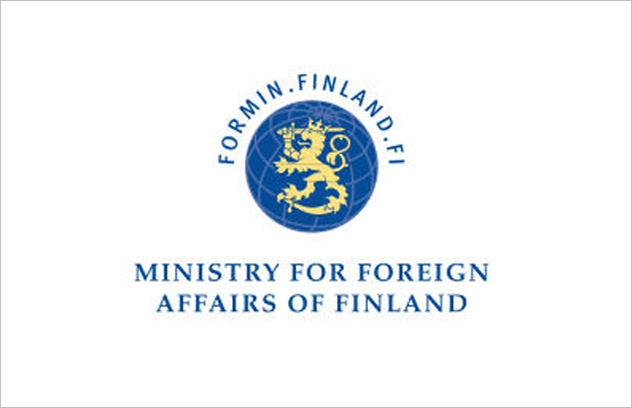
Update
Finland and UNAIDS discuss next steps in the global response to AIDS
01 June 2015
01 June 2015 01 June 2015On 28 May, Deputy Executive Director of UNAIDS Luiz Loures visited Finland to identify avenues for cooperation to end the AIDS epidemic by 2030.
During his visit he met with representatives of the Ministry of Foreign Affairs and Ministry of Social Affairs and Health and with members of parliament to discuss how collective investments in the AIDS response have yielded impressive results and how they can be leveraged to reach people being left behind.
Mr Loures noted that all populations are not being reached equally. AIDS-related illnesses remain the number one cause of death among women of reproductive age and new HIV infections among young women and vulnerable groups remain high. Fifteen countries account for 75% of new HIV infections globally, including four of Finland’s seven long-term partner countries.
He also highlighted the need for innovative approaches to bring the benefits of science closer to communities, using data and mobile technology to better target public health investments, and expanding prevention efforts to social media to reach young people.
During his meetings, Mr Loures outlined the UNAIDS Strategy, currently being reviewed by the UNAIDS Programme Coordinating Board, which aims to break the trajectory of new HIV infections and sets forth a plan to Fast-Track the end of the AIDS epidemic as a public health threat. He also highlighted how UNAIDS’ work extends beyond the health sector to address issues of human rights, gender equality and building inclusive societies, areas that are at the core of Finland’s priorities.
Mr Loures praised Finland’s model of economic growth and social development and said it was a model that other countries could follow. Pekka Puustinen, Director-General of the Finnish Department of Development Policy, emphasized that Finland remains committed to peace and security and that UNAIDS’ work in addressing human rights, stigma and discrimination contributes to more stable societies. Through its participation in the UNAIDS Programme Coordinating Board, Finland continues to use its experience to influence global policy on health, sexual and reproductive health and rights, and development.
As part of the visit, Mr Loures also met with faith-based and other community organizations providing services to people living with and at risk of acquiring HIV living in Finland to learn from their experiences.
Quotes
"Finland's strategic advantage is that it combines a well-run economy with a profound commitment to gender equality and strong health and education systems. This provides a model for other governments that are considering how to combine economic growth with a vision for social development.”
"Finland remains committed to peace and security and greatly appreciates UNAIDS' work addressing human rights, stigma and discrimination which contribute to more stable societies."
Region/country
Related
 Government ensures continuity of treatment in Malawi
Government ensures continuity of treatment in Malawi

10 February 2025

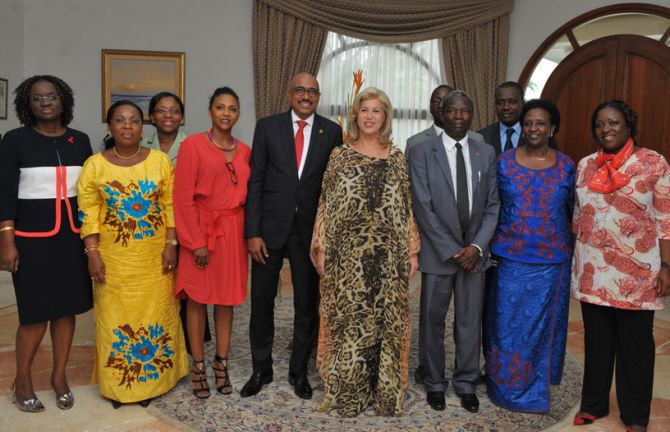
Update
First Lady of Côte d’Ivoire promotes the health of children and their mothers
02 June 2015
02 June 2015 02 June 2015While on a brief stop in Abidjan, Côte d’Ivoire, UNAIDS Executive Director Michel Sidibé met with First Lady Dominique Ouattara and congratulated her on the work she is carrying out to prevent mother-to-child transmission of HIV. As a UNAIDS Special Advocate, Ms Outtara is committed to improving access to antiretroviral therapy for women and children living with HIV.
Ms Outtara, a long-time humanitarian activist, has recently launched an action plan to ensure that no child is left behind in the AIDS response in Côte d’Ivoire and the rest of Africa. The goal is to stop new HIV infections among children and keep their mothers healthy. Achieving an AIDS-free generation is a priority for UNAIDS.
Quotes
“We have advanced on many fronts in the AIDS response, but children are still being left behind. Dominique Ouattara’s plan is to ensure that children are not forgotten and have access to HIV treatment.”
“I will put all my energy as a UNAIDS Special Advocate to promote the prevention of mother-to-child transmission of HIV.”
Region/country
Related

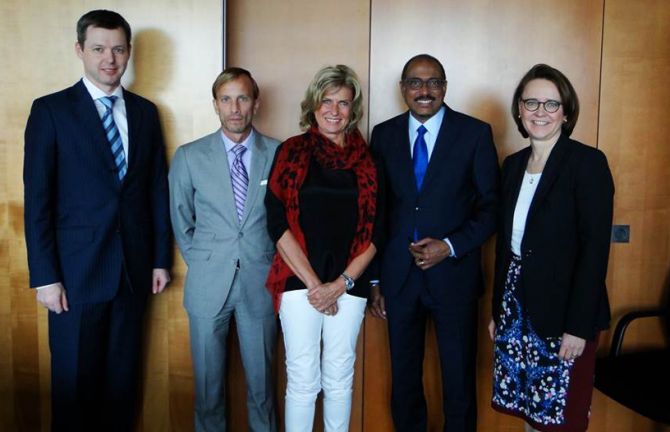
Update
Germany shows strong support for the UNAIDS Fast-Track approach to ending the AIDS epidemic
22 May 2015
22 May 2015 22 May 2015The Executive Director of UNAIDS, Michel Sidibé, and the Executive Director of the Global Fund to Fight AIDS, Tuberculosis and Malaria (Global Fund), Mark Dybul, met with German parliamentarians and ministers to discuss the importance of a continued commitment to ending the AIDS epidemic.
The Committee on Economic Cooperation and Development held a parliamentary breakfast in which the critical role of UNAIDS and the Global Fund was highlighted alongside Germany’s contribution to the AIDS response.
Mr Sidibé remarked on Chancellor Angela Merkel’s participation at the opening of the World Health Assembly and commended her commitment to health issues. He also emphasized the importance of increased momentum over the next five years in order to break the trajectory of the epidemic for good. He explained why the UNAIDS Fast-Track approach and the 90–90–90 targets were so important.
Members of the German Bundestag attending the session raised questions about the sustainability of the AIDS response in the countries most affected and on the process of moving from the Millennium Development Goals towards the sustainable development goals. Dagmar Wöhrl, Chair of the Committee on Economic Cooperation and Development, said that she was particularly concerned about mother-to-child transmission of HIV and that efforts needed to be stepped up.
Mr Sidibé and Mr Dybul subsequently met with Parliamentary State Secretary Thomas Silberhorn and the Minister of Health, Hermann Gröhe.
Germany is one of the largest donors to the Global Fund and has demonstrated ongoing support to UNAIDS since its creation.
Quotes
“We have a fragile five-year window to further quicken the pace of action. This will require extensive mobilization and prioritization. It will also require significant commitments from both national and international sources.”
“Ending AIDS, tuberculosis and malaria can only be achieved by changing our approach to human rights.”








